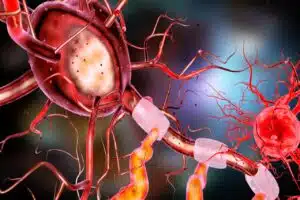Low levels of B vitamins can affect your body in many different ways because of the vitamin’s far-reaching and interrelated effects. B vitamins are thiamine (B1), riboflavin (B2), niacin (B3), pantothenic acid (B5), pyridoxine (B6), biotin (B7), folate (B9), and cobalamin (B12). Here is why you should consider taking vitamin B complex daily.
Vitamin B deficiency
A B vitamin complex deficiency can show up in multiple ways. Any one of these common symptoms could be a result of low levels of one or more B vitamins whether B1, B2, B3, B5, B6, B7, B9, or B12:
- Inability to sleep well
- Fatigue and apathy
- Mental fog, confusion, and forgetfulness
- Mood swings and irritability
- Gastrointestinal symptoms
- Joint or muscle discomfort
- Muscle weakness
- Loss of muscle mass
- Numbness or tingling in fingers and toes
- Frequent bruising
- Headaches
- Irritability
- Dry, cracking skin
Because the vitamin B complex is a group of eight major B vitamins (B1, B2, B3, B5, B6, B7, B9, B12) that work together, you can impact their synergy just by running low on one. For example, many of the B complex vitamins are needed for healthy skin. If you are low in one or two, that can affect the actions of others.
Why You Could Be at a Risk for a Vitamin B Deficiency?
Packaged processed foods can be low in B vitamins.
Fresh, whole foods like meat, fish, dairy, and whole grains provide ample supplies of B vitamins. Yet once you process those foods, you jeopardize the integrity of the B vitamins as many are sensitive to heat, light, air, and long storage times.
Also, certain groups of people are more likely to have a deficiency or suboptimal levels of one or more B vitamins whether B6, B9 or B12 or any other B vitamin:
- Those with gut issues (the vitamins may not be absorbed properly)
- Those who regularly drink alcohol
- Vegetarians and vegans
- Those who drink more than four cups of coffee daily
- Those regularly consuming a high-calorie, high-carbohydrate diet with low nutrient value
- Those avoiding key dietary sources of B vitamins, like dairy and whole grains
- Older adults (your ability to produce an intrinsic factor for absorption decreases)
- Those taking antacids and proton-pump inhibitors (could interfere with absorption)
B vitamins in general are not absorbed well. Add one or more of the above factors and you can easily put yourself at risk for low levels or a deficiency.
Taking Methyl B Vitamins is highly recommended. One of the key B vitamins whose availability and absorption can be impacted by several of these conditions (especially avoiding animal products) is vitamin B12 or cobalamin. It’s estimated that 1 in 4 American adults are deficient in this important energy vitamin, and nearly half the population may have blood levels considered too low. A vitamin B12 deficiency can exist for years under the radar without causing symptoms. By the time you start noticing its classic signs of fatigue, mental fog, forgetfulness, mood swings, and muscle weakness, you can be significantly deficient. Some of the Most At-Risk Vitamins B Vitamins!
As I have just pointed out, many of the B vitamins are susceptible to damage from various sources: heat, light, oxygen, and acid and alkaline solutions, as well as storage. Considering the harsh and high-heat processing methods used to create convenience and packaged foods available today, it’s no surprise that processed foods may be deficient in B vitamins!
Here is a guide to the B vitamins your body needs each day, the recommended amounts, how they can be damaged during processing and storage, and the important roles they play in your health: As you view this chart, I invite you to ask yourself an important question: How might a shortage in this vitamin affect my health and well-being?
B Vitamins Recommended Adult Daily Intake, Susceptibility to damage during processing and storage, and Important Functions –
Thiamine (Vitamin B1)
- B1 Recommended daily intake – 1.2 mg; 1.4 mg for pregnant and lactating women
- Thiamine (B1) is sensitive to heat, oxygen, humidity, and light, and very sensitive to alkaline pH.
- Thiamine (B1) is essential for the metabolism of fats and carbohydrates, energy metabolism for the nervous system and muscles
Riboflavin (Vitamin B2)
- B2 Recommended daily intake – 1.3 mg; 1.6 mg for pregnant and lactating women
- Riboflavin (B2) is sensitive to humidity and light
- Riboflavin (B2) is essential for growth and muscle development, eye health, and healthy skin
Niacin (Vitamin B3)
- B3 Recommended daily intake – 16 mg; 18 mg for pregnant and lactating women
- Niacin (B3) is stable
- Niacin (B3) is essential for the proper function of enzymes and a healthy nervous system, skin, nails, and GI function
Pantothenic Acid (Vitamin B5)
- B5 Recommended daily intake – 5 mg; 7 mg for pregnant and lactating women
- Pantothenic acid (B5) is sensitive to heat and humidity
- A structural element of many coenzymes plays a central role in energy metabolism and the synthesis of sex hormones
Pyridoxine (Vitamin B6)
- B6 Recommended daily intake – 1.7 mg; 2 mg for pregnant and lactating women
- Pyridoxine (B6) is very sensitive to heat and sensitive to humidity, light, and acid pH
- Pyridoxine (B6) is essential for the body’s utilization of protein and the synthesis of neurotransmitters
Biotin (Vitamin B7)
- B7 Recommended daily intake – 30 mcg; 35 mcg for pregnant and lactating women
- Biotin (B7) is sensitive to humidity and light
- Biotin (B7) supports healthy normal growth, digestion, muscle function, healthy skin and hair, and cellular health
Folate (Vitamin B9)
- B9 Recommended daily intake – 400 mcg; 600 mcg for pregnant and lactating women
- Folate (B9) is very sensitive to heat, acid pH, and light and sensitive to humidity
- Folate (B9) is required for the production of red blood cells in bone marrow
Cobalamin (Vitamin B12)
- B12 Recommended daily intake – 2.4 mcg; 2.8 mcg for pregnant and lactating women
- Cobalamin (B12) is sensitive to heat, oxygen, humidity, and contact with iron or copper
- Cobalamin (B12) supports protein, carbohydrate, and fat metabolism, GI and nervous system health, immune function, and the healthy production of red blood cells
The B vitamins most at risk of losing their vitamin activity are in this order (from worst to best):
Pyridoxine (B6), Thiamine (B1), Cobalamin (B12), Folic Acid (B9), Niacin (B3), Biotin (B7), and Riboflavin (B2).
B Complex Vitamins: You Can NOT Thrive Without Them
Your brain and nervous system can be the first areas to be affected if you are low in certain B vitamins.

The entire family of B vitamins is essential for your health.
As we’ve just seen, these water-soluble nutrients are required for your healthy normal:
- Brain and nervous system function
- Growth and development
- Immune function
- Energy production
- Cell metabolism
- Organ and tissue health
- Muscle, skin, and eye health
- Appetite and digestion
The B vitamins act as coenzymes and play a key role in the metabolism of carbohydrates, protein, and fat. Like a well-oiled machine, B vitamins work together to support energy production and the health of your brain, liver, muscle, nervous and immune systems, skin, and eyes.
Unlike fat-soluble vitamins and the one exception, vitamin B12, excess amounts aren’t stored in your body. Rather, if not immediately needed, they pass through your body in your urine. This means you must get the entire B complex of vitamins through diet every day. Because you need them in the right proportions to each other, I recommend a vitamin B complex rather than individual B vitamins.
Why B Vitamins Are So Crucial for Your Memory
B vitamins are important for mood, motor function, memory, and nerve and brain health. When you have a limited supply of B vitamins, your central nervous system can be the first to be affected. Omega-3 fatty acids are vitally important for your brain health, and now researchers are finding B vitamins to be valuable as well.
All of the B vitamins are important for brain and nerve cells, but some stand out for their role in supporting memory, cognitive health, and brain performance: vitamin B1 (thiamine), B3 (niacin), B6 (pyridoxine), B12 (cobalamin), and B9 (folate).
As I previously mentioned, mental fogginess and forgetfulness are two of the top warning signs that you may not be getting enough vitamin B12. Vitamin B1 is well-known for supporting positive moods and promoting brain function, especially concentration, memory, and reaction time. Vitamins B6, B9, and B12 help convert homocysteine into methionine, an important building block for proteins. If you are low in any of these three B vitamins, that process can be interrupted and your homocysteine levels can rise which is a useful marker for Heart Disease

Prof. Dr. George Grant
Related Posts

MCT Oil For Weight Loss and Belly fat loss
While there is no effective remedy for quick weight loss except for rigorous dietary restrictions that can take a toll on your health, here is

Whey protein isolate vs concentrate and benefits
Check out the protein requirements, whey protein, whey protein isolate vs concentrate, several benefits of the same, and who should not consume protein supplements. Protein

12 Essential Nutrients for Pregnancy- Your Plate Guide
What is the real food in pregnancy? Which food to eat during pregnancy? What are the daily nutritional requirements during pregnancy? What is the importance

Fatty Acids, Triacylglycerol, Cholesterol – The Wonders of Fats!
Are fats healthy? Check out the wonders of fats – the fatty acids such as MUFA and PUFA, the triacylglycerol, and the cholesterol. As a

Multivitamin, Probiotic, Omega 3 – Don’t Let Dietary Supplement Selection Overwhelm You
You’re here. You have finally decided to take control of your health and are looking into which dietary supplement to add to your wellness toolbox.

Keto BHB Pills – The Magic Of Beta Hydroxybutyrate
We all have heard about ketogenic diets or the commonly used term keto diets for weight loss. The state of ketosis produces ketone bodies that


